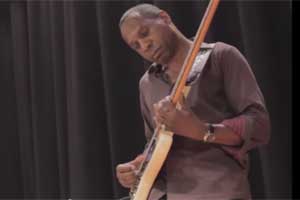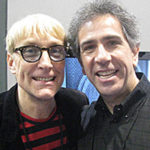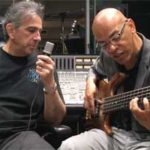Conversation with Mike Merritt, the Conan O’Brien bassist and son of jazz legend Jymie Merritt, who is a star in his own right!
Exclusive interview with FBPO’s Jon Liebman
August 24, 2009
Mike Merritt, son of jazz bass legend, Jymie Merritt, discovered the bass in his teens while tagging along on his father’s gigs. Having grown up in the Philadelphia area, Mike eventually moved to New York, where he began a long association with bluesman Johnny Clyde Copeland and later became an active member of the New York blues scene.
Through his association with Jimmy Vivino, Mike landed the gig as the house bassist for the Conan O’Brien show, a position he’s held since 1993.
FBPO: Growing up the son of legendary jazz bassist Jymie Merritt, was it just assumed that you would follow in his footsteps? Was there ever anything else you wanted to do?
MM: Well, the first thing I really wanted to do was to make films. I wanted to be a filmmaker since I was about 10 or 12 years old. At that time there were no portable video cameras; it was all on film stock, real old school. I went to the Philadelphia Art Museum to ask about a course they were offering, and they told me it was cancelled due to lack of interest. How things have changed! Bass playing was much more accessible to me. By the time I was 17 it felt like the way to go. I was inspired by watching Jymie play with cats like Lee Morgan and Max Roach and was also inspired by what I was listening to at the time, mostly rock n’ roll. I think Jymie would have liked to see me be mainly a jazz player, but I’m of a different generation and jazz is just one of many types of music I like to play.
FBPO: For most of us, it’s hard to imagine having people like John Coltrane or Bobby Timmons drop by the house for a visit! What was that like? Were you able to appreciate what a big deal that was, or were these guys just “Dad’s friends?”
MM: I was too young to really know who those cats were during that time. It wasn’t until later, when I was a teenager, that I started listening to records and hanging out with my dad at his gigs that I realized how much of a rep he had as a player.
FBPO: Did you feel any pressure when you set out to become a serious bass player, being Jymie Merritt’s son?
MM: Yes, I did feel pressure, but I put that on myself. Once I realized I had different musical sensibilities and that jazz was just one piece of the musical environment I wanted to be in, it changed. I remember being at a jazz jam session in NYC, sitting in and trying to prove myself, and they called the tune “Yesterdays.” I thought, “Wow, we’re gonna do a Beatles tune!” It turned out to be the Jerome Kern standard, which I learned in a hurry! After that, I just opened myself up to get involved in situations playing rock and blues because they inspired me as much as jazz did.
FBPO: Tell me about how the blues played such an important role in your development as a musician.
MM: Well, I had always known that Jymie played with B.B. King in the 50s and had done lots of blues and R&B gigs back in the day. So when I started with Johnny Copeland, I remembered what Jymie once told me, that to really play jazz you’ve got to play the blues. And playing blues helped me understand popular American music. So, with one part of me rooted in jazz and another part in the blues, it felt so natural to play rock, soul, and just about everything else.
FBPO: Obviously, you’ve got jazz in your genes, but you were also raised on Eric Clapton, Led Zeppelin, Jimi Hendrix, ELP, Creedence, the Stones and many other rock groups of the day. What music do you find most satisfying to play and/or hear?
MM: Oddly enough, getting back to the film thing, I like listening to film scores. So many of the best ones can stand alone as works of art on their own. The old school guys, like Bernard Herrman, Alex North and Jerry Goldsmith, redefined the form. Most of the newer stuff lacks personality, but that also reflects the films themselves. Before I moved to LA, I was part of Levon Helm’s Midnite Ramble Band in Woodstock, NY. This was a really satisfying musical situation because we played everything – blues, country, rock, soul, jazz – you name it! If it was American music, it was on that stage.
FBPO: How did the Conan gig come about? How does it feel to play the coolest TV theme intro since Barney Miller?
MM: I knew Jimmy Vivino before the gig happened. We had worked together with Johnnie Johnson. Jimmy was involved in a project with Max Weinberg called “Killer Joe.” I did a few gigs with them in NYC about a year before “Conan.” Later, when Max was putting the band together to audition for the show, they called me.
I didn’t know the bass line had become so iconic. I love playing it. I’ve changed it up a little for The Tonight Show, since the theme was re-arranged a bit.
FBPO: Talk about the adjustment of relocating from New York to LA. There’s such a marked difference in everything: attitude, overall vibe and, of course, music. Any culture shock there?
MM: We knew about the move for some time beforehand, so I was kind of prepared. Relocating cross-country was mind boggling – a level of stress that I would not want to repeat – but it’s great being out here. There’s only one Tonight Show, and I’m on it. I’m very grateful for the opportunity to continue what we were doing in NY, to take it to another level. Haven’t really plugged into the music scene out here yet, but there’s time. Still haven’t found good pizza.
FBPO: In addition to being a sideman for a veritable who’s who of music icons (B.B.King, Bonnie Raitt, Jackson Browne, Branford Marsalis, Robert Palmer, Pete Townsend, Bruce Springsteen, Tony Bennett, James Brown, Michael Brecker, Tony Williams, Louie Bellson and countless others), you’ve released your own album as a leader. How would you describe Alone Together and what was it like working with your sister, Mharlyn?
MM: Most of these artists you mention I played with when they were guests on the Late Night show. As for the CD, this was a way for us siblings to connect musically and to document it. We had never really worked together when we were starting out in Philly because we were finding our own paths, so to speak. This project is a tribute to our roots, in a way, since Jymie was a musician and our late mother, Dorothy, listened to so much good jazz around the house when we were kids. The influences rubbed off and this was a way to reflect that.
FBPO: What lies ahead for Mike Merritt?
MM: I’m feeling that it’s time to write original music, express my own take on what I’ve been doing as a player all of these years. I’m not sure how it’s going to come out – maybe jazz, blues, rock or none of the above. That’s what I want to find out.




